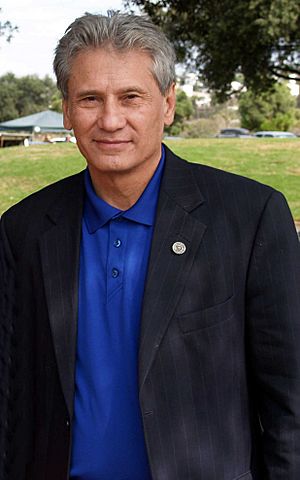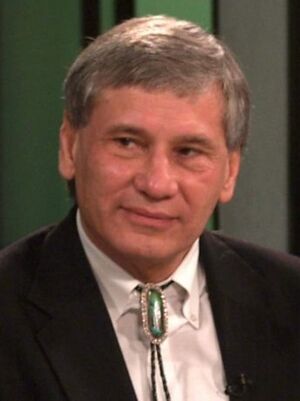Chad Smith (politician) facts for kids
Quick facts for kids
Chad Smith
|
|
|---|---|
| Ugista | |

Smith in 2007
|
|
| Principal Chief of the Cherokee Nation | |
| In office 1999–2011 |
|
| Preceded by | Joe Byrd |
| Succeeded by | Joe Crittenden (acting) |
| Personal details | |
| Born | December 17, 1950 Pontiac, Michigan, U.S. |
| Spouse | Bobbie Scott |
| Education | University of Georgia (BS) University of Wisconsin, Madison (MPA) University of Tulsa (JD) University of Nevada, Las Vegas (MBA) |
Chadwick "Corntassel" Smith (whose Cherokee name is Ugista, meaning "Corntassel"; born December 17, 1950) is a Cherokee Nation leader and lawyer. He served as the Principal Chief of the Cherokee Nation, which is like being the main leader of the tribe. He was first chosen for this important role in 1999.
Smith was re-elected two more times, in 2003 and 2007. In 2011, he tried for a fourth term but was not re-elected. Before becoming Principal Chief, he worked as a lawyer for the Cherokee Nation and in his own law office.
Contents
Growing Up and Learning
Chad Smith was born in Pontiac, Michigan. His father was Cherokee, and his mother was of Western European background. This means Chad Smith is half Cherokee. He grew up in Nashville, Tennessee. When he was a boy, he became an Eagle Scout in the Boy Scouts.
He heard many stories about his Cherokee ancestors as he grew up. His great-grandfather was Redbird Smith, a Cherokee Nation Senator. Redbird Smith was a traditionalist who started the Keetoowah Nighthawk Society. This group worked to bring back the Cherokee way of life. Redbird Smith also fought against a U.S. government policy called the Dawes Act. This act took away millions of acres of land from the Cherokee people. Chad Smith's grandmother, Rachel Quinton, also worked hard to support the Cherokee people throughout her life.
Chad Smith went to several universities. He earned a bachelor's degree from the University of Georgia in 1973. He then got a master's degree from the University of Wisconsin in 1975. Later, he earned a law degree from the University of Tulsa in 1980. In 2008, he received another master's degree in business from the University of Nevada-Las Vegas.
Chad Smith's Career
Chad Smith had a long career in law and public service. From 1979 to 1980, he advised the Cherokee Nation on Indian Law. He also worked as an Assistant District Attorney in Oklahoma from 1982 to 1986. He was an Estate Tax Attorney for the U.S. government for several years.
From 1985 to 1995, he worked as a prosecutor for the Cherokee Nation. This was during the time Wilma Mankiller was Principal Chief. He also had his own law practice in Tulsa, Oklahoma, where he helped people with civil rights and criminal defense cases. He also worked as an Assistant Public Defender, helping people who could not afford a lawyer.
Before becoming Principal Chief, Smith taught Indian law at several universities, including Northeastern State University, Rogers State University, and Dartmouth College.
Leading the Cherokee Nation
Chad Smith served as the Principal Chief of the Cherokee Nation from 1999 to 2011. The Cherokee Nation is the second largest Native American tribe in the United States, with over 285,000 citizens. The Principal Chief is the main leader of the tribal government. This role involves making sure the tribe's laws are followed and setting policies for the tribe's daily operations.
Smith was first elected Principal Chief on July 24, 1999. He won against the chief at the time, Joe Byrd. Smith received more than 56% of the votes. During his first term, Hastings Shade, a Cherokee traditionalist and artist, served as his deputy chief.
Smith was re-elected in 2003 and 2007. For these terms, Joe Grayson, a bilingual community organizer and military veteran, was his deputy chief.
In 2006, Smith supported changing the Cherokee Nation's constitution. This change would have limited citizenship to only those with "Indian blood." This action led to about 2,800 people, known as the Cherokee freedmen, being removed from the tribe. These individuals were descendants of people who had been enslaved by Cherokees. Smith argued that because the Cherokee Nation is a sovereign nation, it could set its own rules for citizenship. However, this action went against a treaty made after the Civil War. That treaty said that formerly enslaved people had full citizenship rights. This issue was debated in both U.S. federal courts and Cherokee Nation courts.
Smith ran for a fourth term in 2011 but was not re-elected. The election was very close, and a second vote was ordered. Smith left office on August 14, 2011, as the constitution did not allow elected officials to stay in office past Inauguration Day. S. Joe Crittenden became the acting principal chief.
During his time as Principal Chief, Smith focused on three main goals:
- Making the tribe financially strong.
- Bringing back the Cherokee language and culture.
- Helping communities grow in Northeastern Oklahoma.
Language programs were started to help Cherokee children and young people learn their language. Smith also helped make the term gadugi popular. In Cherokee, gadugi means working together for the good of everyone.
The Cherokee Nation saw steady economic growth while Smith was chief. There was growth in farming, businesses, and real estate. Some of this growth was funded by money from casino operations. The Cherokee Nation owns Cherokee Nation Entertainment, a company that runs casinos and hotels. It also owns Cherokee Nation Industries, which is a defense contractor.
Since 1992, the Cherokee Nation has led the Inter-Tribal Environmental Council (ITEC). ITEC works to protect the health of Native Americans, their natural resources, and their environment. It helps with air, land, and water issues. ITEC provides support and training to 39 member tribes in Oklahoma, New Mexico, and Texas.
In February 2021, the Supreme Court of the Cherokee Nation decided that the "by blood" citizenship rule was illegal. They said it was unfair to the descendants of the Freedmen. A U.S. federal court had also rejected this restriction in 2017.
Family Life
Chad Smith is married to Bobbie Gail Smith. She is a full-blooded Cherokee from the Rocky Mountain community in Adair County, Oklahoma.
Books by Chad Smith
Chad Smith has written or contributed to several books:
- Smith, Chadwick Corntassel and Rennard Strickland with Benny Smith. ᎥᎪᏢᏍᎬ ᏌᏊ ᎠᏥᎸ: Building One Fire, Art and World View in Cherokee Life. Norman: University of Oklahoma Press, 2010. ISBN: 978-1-61658-960-8.
- McClinton, Rowena and Chad Smith. The Moravian Springplace Mission to the Cherokees. Lincoln: University of Nebraska Press, 2007. ISBN: 978-0-8032-3266-2.
- Robert J. Conley, author, David Fitzgerald, photography, and Chadwick Smith, introduction. Cherokee. Portland, OR: Graphic Arts Center Publishing Co., 2002. ISBN: 9781558686038.
- Smith, Chadwick Corntassel. Leadership Lessons from the Cherokee Nation: Learn From All I Observe. McGraw-Hill, 2013. ISBN: 978-0-0718-0883-5 .
 | DeHart Hubbard |
 | Wilma Rudolph |
 | Jesse Owens |
 | Jackie Joyner-Kersee |
 | Major Taylor |


